Why Large Language Models Are eCommerce's Core in 2025?
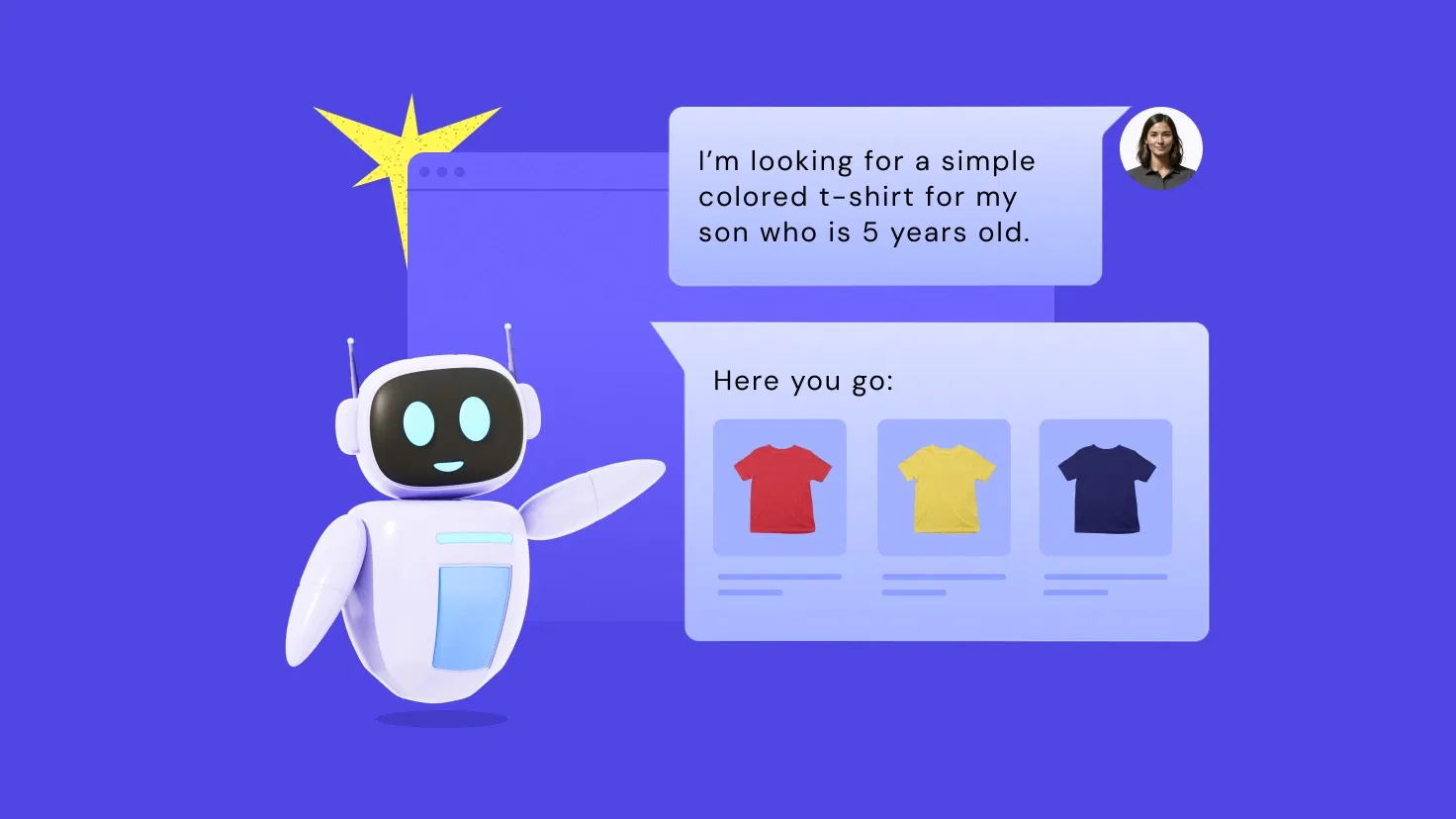
What’s Inside
- What Is a Large Language Model (LLM)?
- Why Traditional Search Alone Isn’t Enough Anymore
- What Is the Role of Large Language Models in eCommerce?
- How Are LLMs Based on Generative AI?
- What Are the Benefits of Implementing LLMs in eCommerce?
- Which Best Practices Should You Follow When Adopting LLMs for Your Businesses?
- What are the Use Cases of LLMs in Retail and eCommerce?
- What Are the Challenges & Considerations While Choosing an LLM?
- What Are the Future Trends in LLM for Online Retail?
- How Experro Helps Your Business Leverage LLMs?
- Final Thoughts
Key Takeaways
- Large language models in eCommerce decode user intent, delivering highly relevant and contextual search results.
- LLMs for eCommerce personalize shopping experiences by adapting content and product visibility in real-time.
- LLM-powered tools help retailers automate product content, from descriptions to category pages, saving time and ensuring consistency across the storefront.
- Experro has in-built LLM eCommerce capabilities to power smarter, faster agentic experiences.
Is your eCommerce platform ready for the next big leap in personalization and efficiency?
The integration of Large Language Models (LLMs) is revolutionizing the online retail landscape. It offers new and effective ways for businesses to enhance customer retention and streamline operations.
By harnessing the power of LLM technology, eCommerce platforms can deliver more intuitive, responsive, and personalized shopping journeys.
What Is a Large Language Model (LLM)?
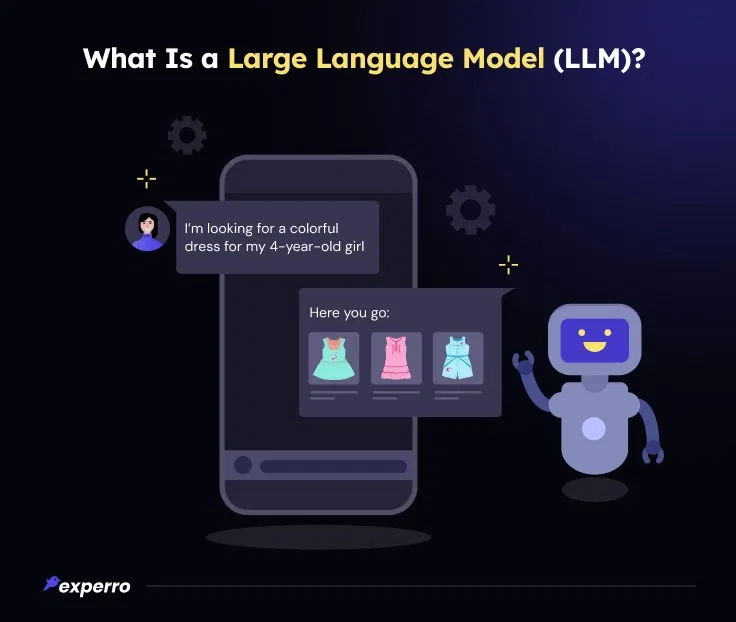
LLM definition - A Large Language Model (LLM) is an advanced artificial intelligence system designed to understand and generate human-like text based on extensive language data.
These generative AI in eCommerce are trained on vast datasets, enabling them to comprehend context, interpret nuances, and produce instant responses.
In the context of eCommerce, LLMs can analyze user queries, generate product descriptions, facilitate natural conversations, and a lot more.
Why Traditional Search Alone Isn’t Enough Anymore
Traditional search functions have been the backbone of online retail, allowing customers to find products using keywords and filters.
These methods often lack the depth to understand user intent fully. However, normal search isn’t becoming outdated — it’s simply improving.
Integrating LLM in eCommerce industry with existing search functionalities enhances their capabilities, enabling a more intuitive and context-aware search experience.
LLM for eCommerce enhances traditional search by improving search relevance and personalization while keeping the familiar experience intact.
What Is the Role of Large Language Models in eCommerce?
LLMs are transforming eCommerce by enabling platforms to understand better and predict customer needs.
They facilitate personalized product recommendations, generate engaging content, and power intelligent AI agents for a wide range of business functions, including customer support.
By analyzing vast amounts of data, LLM in eCommerce helps retailers optimize inventory management and pricing strategies.
This leads to a more efficient operation and a shopping experience that resonates with individual customers, fostering loyalty and increasing sales.
How Are LLMs Based on Generative AI?
LLMs are a subset of Generative AI, which refers to algorithms capable of creating new content based on existing data.
These LLMs and generative AI models learn patterns, structures, and relationships within the data they are trained on, allowing them to generate text that is contextually relevant and coherent.
In eCommerce, this means LLMs can craft personalized product descriptions, respond to customer inquiries in a human-like manner, and create marketing content that aligns with brand voice and customer preferences.
The U.S. LLM eCommerce market is projected to grow around USD 20 million by 2032, reflecting a compound annual growth rate (CAGR) of 35.2%.
This rapid growth signals a pressing need for retailers to invest early in LLM-powered tools that enhance personalization, automate operations, and scale effortlessly.
What Are the Benefits of Implementing LLMs in eCommerce?
Integrating LLMs into your eCommerce platform offers a multitude of advantages that can significantly enhance both customer experience and operational efficiency.
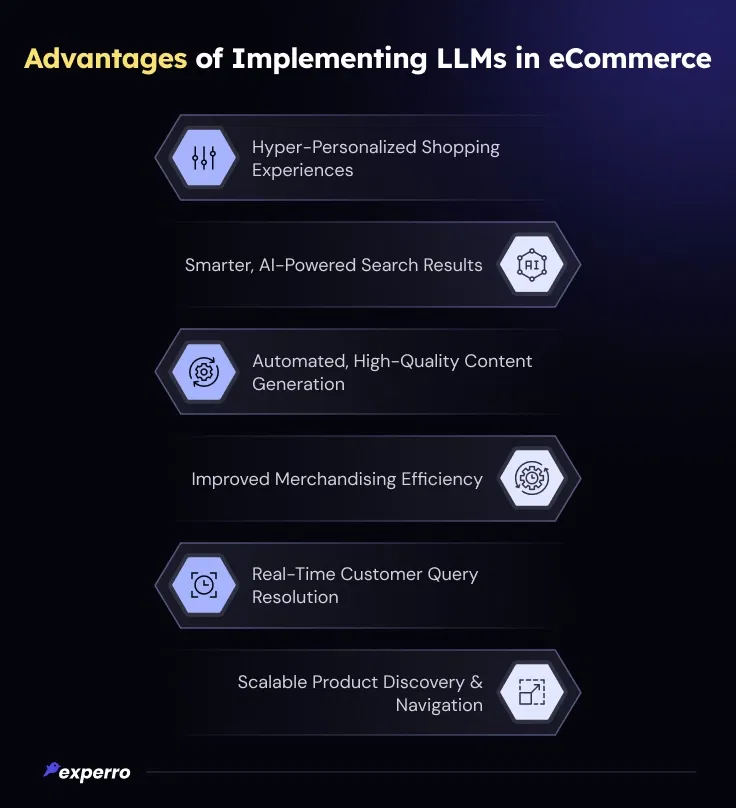
Here are the benefits of equipping your eCommerce with the most advanced LLMs:
1. Hyper-Personalized Shopping Experiences
LLM in eCommerce analyzes individual customer data, such as browsing history and purchase patterns, to deliver hyper-personalization.
This level of personalization makes customers feel valued and understood, leading to increased engagement with the help of conversion rate optimization.
For instance, suggesting complementary products based on past purchases can enhance the shopping experience and boost sales.
2. Smarter, AI-Powered Search Results
Traditional search functions often rely on exact keyword matches, leading to irrelevant results if the customer's query doesn't align perfectly with product listings.
LLMs equipped with gen AI-powered search and agentic capabilities help understanding the context and intent behind queries, delivering more accurate and relevant results.
This reduces frustration and helps customers find what they're looking for more efficiently.
3. Automated, High-Quality Product Content Generation
Creating compelling product descriptions and marketing content can be time-consuming.
LLM in eCommerce can automate this process by generating high-quality, engaging content that resonates with your target audience.
This not only saves time and resources but also ensures consistency in messaging across your platform.
4. Improved Merchandising Efficiency
By analyzing customer data, user preferences, and market trends; LLMs assist in making informed decisions about product placements and promotions.
Digital merchandising leads to optimized inventory management, reducing the risk of overstocking or stockouts, and ensures that popular products are readily available to meet customer demand forecasting.
5. Real-Time Customer Query Resolution
LLM-powered chatbots and AI shopping assistants can handle a wide range of customer inquiries in real-time, providing instant support and information.
This improves customer satisfaction by reducing wait times and allows human support staff to focus on more complex issues.
6. Scalable LLM’s Product Discovery and Navigation
As your eCommerce landscape scales, catalog management and helping customers discover products become more challenging.
LLM for eCommerce sector enhances product discovery by understanding user behavior and preferences, presenting relevant products, and simplifying the navigation process.
This scalability ensures a seamless shopping experience, even as your inventory expands.
That’s all, these are the reaping benefits of equipping your eCommerce with the most advanced LLM system.
Which Best Practices Should You Follow When Adopting LLMs for Your Businesses?
To fully leverage the potential of LLMs in your eCommerce operations, consider the following best practices:
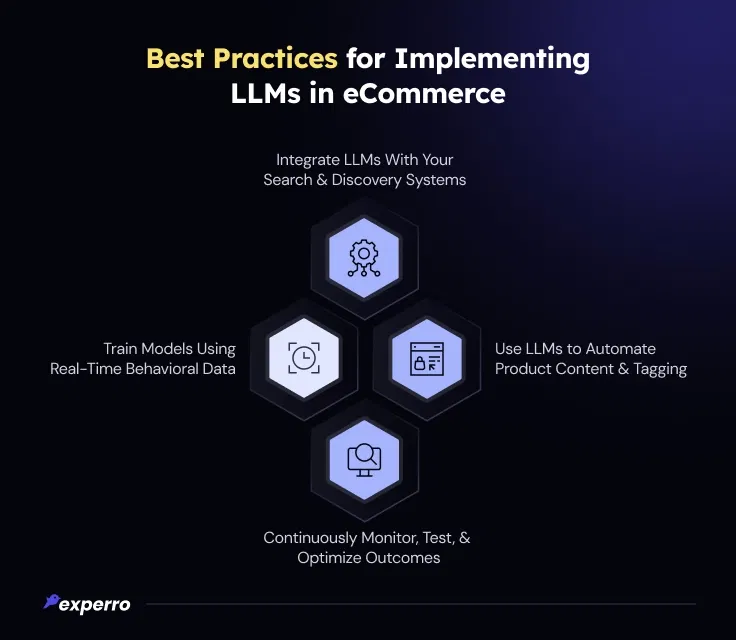
1. Integrate LLMs With Your Search and Discovery Systems
Enhance your platform's search functionality by incorporating LLMs to interpret and respond to natural language search queries.
This integration with a large language model for search leads to more intuitive and accurate query results, improving the overall user experience.
2. Train Models Using Real-Time Behavioral Data
Continuously update your LLMs with real-time data on customer behavior and preferences.
This ensures that the models remain relevant and effective in delivering gen AI-powered personalized experiences and recommendations.
3. Use LLMs to Automate Product Content and Tagging
Leverage LLM for eCommerce to generate product descriptions and tags automatically.
This not only saves time but also enhances eCommerce SEO efforts and ensures that products are easily discoverable by customers.
4. Continuously Monitor, Test, and Optimize Outcomes
Regularly assess the performance of LLM for omnichannel retail and multichannel implementations to identify areas for improvement.
A/B testing and user feedback can provide valuable insights to refine and optimize the models for better results.
Now that we have learned about the best practices in implementing LLMs in eCommerce, let’s jump into the use cases that help retailers and eCommerce businesses with customer engagement.
What are the Use Cases of LLMs in Retail and eCommerce?
Adopting LLMs opens practical applications that can transform customer experiences and internal operations.
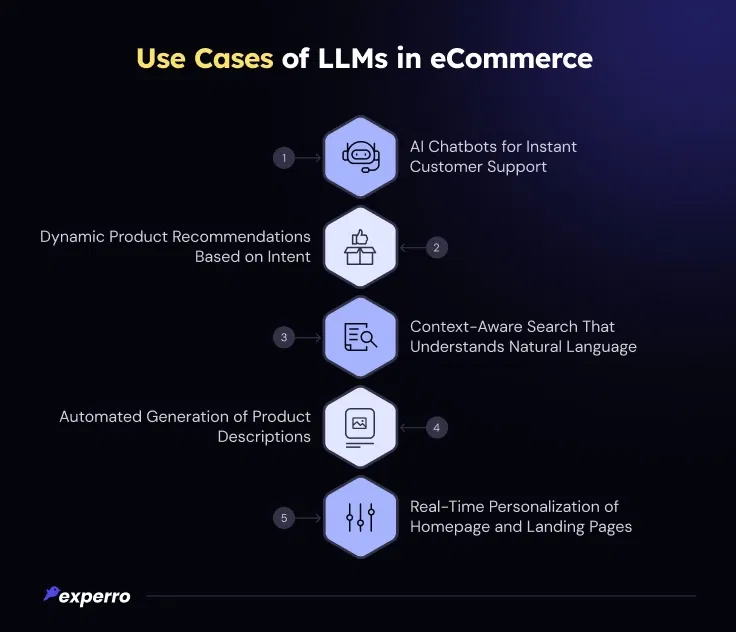
Below are key LLM use cases in eCommerce and retail environments:
1. AI Chatbots for Instant Customer Support
LLM-powered chatbots offer human-like conversations around the clock. They understand complex queries, resolve issues, and even upsell products during conversations.
These LLM-powered systems free up human agents for critical tasks and ensure a faster, smoother support experience.
2. Dynamic Product Recommendations Based on Intent
Unlike rule-based recommenders, eCommerce LLMs interpret the actual intent behind customer behavior.
They analyze sessions, queries, and preferences to serve highly relevant product suggestions. This leads to more accurate, LLM-driven personalization that also optimizes conversion rates.
3. Context-Aware Search That Understands Natural Language Processing
With NLP and LLM, search becomes smarter and more intuitive. Customers can ask, “Show me summer dresses under $50” and get precise results.
This LLM for eCommerce search delivers better discovery and reduces bounce rates.
4. Automated Generation of Product Descriptions
Generating engaging product content and providing personalization at a scale is challenging for the businesses with legacy practices.
LLM content automation enables retailers to quickly produce SEO-friendly descriptions, meta tags, and marketing copy that aligns with the brand’s tone and audience.
5. Real-Time Personalization of Homepage and Landing Pages
Personalized shopping with eCommerce LLM extends beyond recommendations.
These models can dynamically adjust content personalization, banners, and promotions based on user behavior. The result is a website that feels tailor-made for every visitor.
Learning about the use cases isn’t enough, businesses need to understand the challenges and its considerations while choosing an LLM. Let’s explore them in the next section.
What Are the Challenges & Considerations While Choosing an LLM?
While LLM solutions for retail and eCommerce offer many advantages, businesses must navigate certain challenges to deploy them successfully.
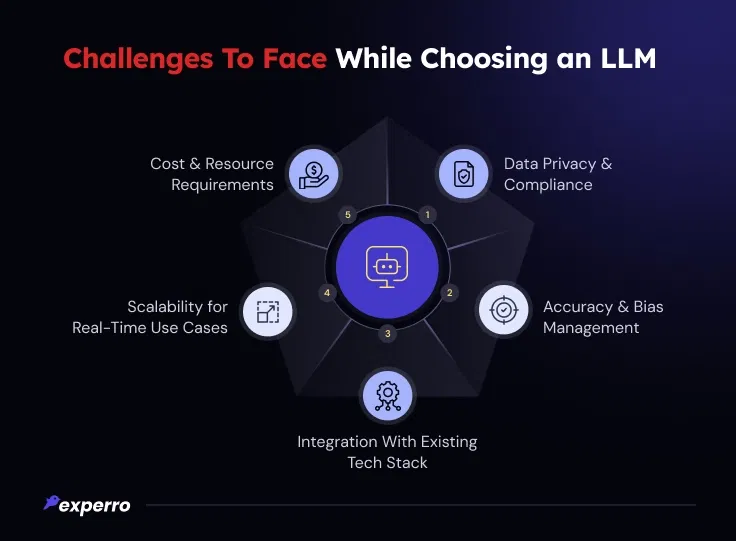
These are the challenges you might face while implementing LLMs in your system:
1. Data Privacy and Compliance
LLMs process large volumes of personal and behavioral data. Ensuring General Data Protection Regulation (GDPR) and the California Consumer Privacy Act (CCPA), and other regional compliance is essential. Retailers must implement clear data governance and anonymization strategies.
Experro ensures compliant personalization with secure and privacy-focused consent management practices.
2. Accuracy and Bias Management
eCommerce LLMs can sometimes generate biased or factually incorrect content. Regular audits, ethical training datasets, and content filtering mechanisms are essential.
Experro’s AI models are continuously refined for accurate, brand-safe results.
3. Integration With Existing Tech Stack
Plugging an LLM into legacy systems can be difficult. Seamless APIs and modular design help in easier adoption.
Experro’s modular, API-first architecture ensures that you can integrate AI capabilities without overhauling your existing systems or workflows.
4. Scalability for Real-Time Use Cases
Running LLM-powered systems in real-time across high-traffic environments requires robust infrastructure. Efficient model optimization and cloud-native deployment are key.
Experro’s cloud infrastructure ensures consistent speed and scale.
5. Cost and Resource Requirements
Fine-tuning and running LLMs for eCommerce can be resource intensive. Retailers should balance cost against expected ROI.
Experro helps by offering tailored plans and lightweight models for faster deployment.
Now that we have explored the challenges and solutions in implementing LLMs in your existing eCommerce systems, let’s dive into the future-faced trends in the next section.
What Are the Future Trends in LLM for Online Retail?
As technology evolves, several trends are shaping the future of LLMs in eCommerce & retail:
- Rise of multimodal search in LLMs combining search through text, images, and voice.
- Emergence of a multi-agent LLM system to handle complex workflows.
- Real-time LLM-driven conversational commerce experiences.
- Use of LLM AI in logistics and LLM supply chain management.
How Experro Helps Your Business Leverage LLMs?
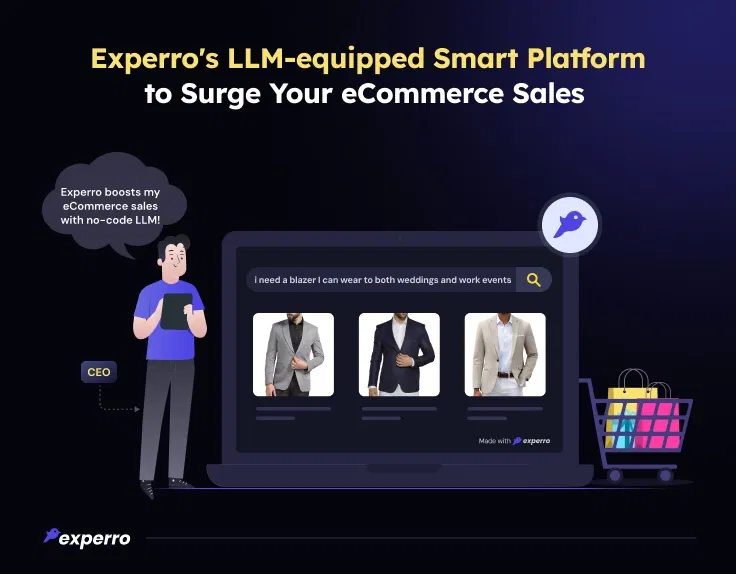
Experro empowers online retailers to unlock the full potential of generative AI and LLMs in eCommerce and retail industry.
The platform combines LLM-based personalization, search intelligence, content automation, and smart AI agents in a unified experience engine.
Online retailers can roll out LLM shopping capabilities faster than ever, optimize based on real-time data, and scale their operations with minimal IT effort.
From smarter eCommerce merchandising to automated support, Experro turns LLM use cases in retail into revenue-driving realities.
Final Thoughts
LLMs in eCommerce are no longer a distant future—they are transforming how businesses engage, convert, and retain customers today.
From smarter searches to personalized experiences and scalable automation, LLM in retail industry offers solutions that resonate with both consumers and retailers.
As the competition intensifies, adopting LLM-powered systems could be the edge your brand needs.
Ready to personalize at scale and grow faster with intelligent automation with the help of LLMs? Then schedule a call with our experts for a personalized walkthrough of how Experro can help.
FAQs


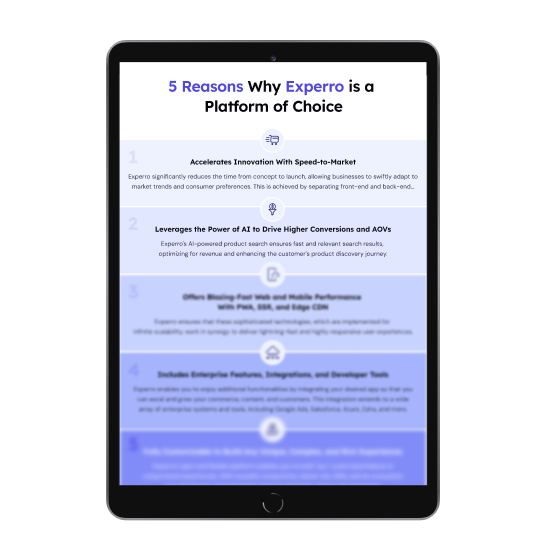
Pallavi Dadhich
15 April 2025Pallavi is an ambitious author known for her expertise in crafting compelling content across various domains. Beyond her professional pursuits, Pallavi is deeply passionate about continuous learning, often immersing herself in the latest industry trends. When not weaving words, she dedicates her time to mastering graphic design.